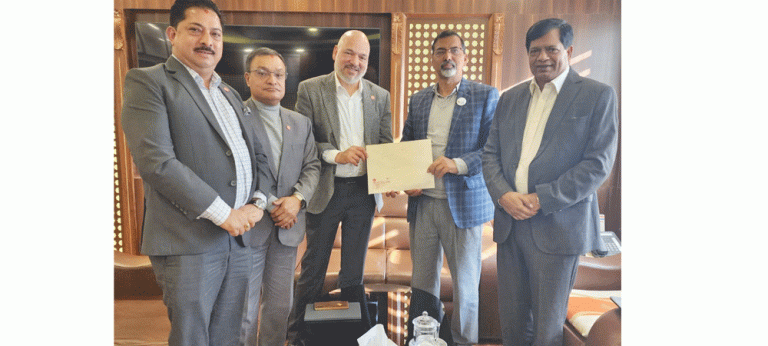
A delegation of the Federation of Nepalese Chambers of Commerce and Industry (FNCCI) has met Finance Minister Janardan Sharma and requested for cooperation and coordination to save the country’s economy.
The delegation led by FNCCI president Shekhar Golchha drew attention of Minister Sharma to the fact that the economy has been adversely affected and that the much-awaited first quarter review of the monetary policy of the current financial year has not addressed the problems.
During the meeting, Golchha said that the targeted revenue could not be collected even after increasing the general expenditure. The private sector is shrinking because of the price increase, which is the highest in seven years, he said.
The guideline related to working capital loan implemented at a time when the private sectors’ investment was shrinking, revenue was continuously decreasing and the country’s economy was under pressure, has only added complexities to businesses, said the FNCCI.
“Fluctuations in the interest rates, national and international economic discomfort, skyrocketing prices of fuel, raw materials and logistics and freight charges have also increased. Due to this, there is a mismatch between the determination of the estimated financial statement and the determination of the actual required limit of working capital. Due to the lack of working capital, difficulty has arisen in the operation of the industry,” read the press statement.
In South Asia, Nepal is experiencing all-round problems due to the increasing time required for international trade and the guidelines related to working capital loan cannot be implemented immediately, it said.
The FNCCI submitted suggestions to the Finance Minister to protect the economy from the multi-dimensional risk during the period of about a year since they started to control the market directly and indirectly.
The FNCCI said that the implementation of the guidelines related to working capital loan 2022 will have to be postponed for at least two years and take initiative for reforming the system affecting the private sector should also be continued for two years.
The FNCCI hoped that the central bank would be positive on this issue as the economy is now demanding for promotional reform rather than punitive from the regulatory bodies.
On the occasion, Finance Minister Sharma said that he has taken the continuous initiative of the Federation to reduce the risk of the economy very positively.
Stating that the government is also serious about this, he said that support from the Ministry will continue to move forward with the cooperation and coordination among government, central bank and private sector according to the suggestion given by the FNCCI to improve the economy.
Source : TRN,






